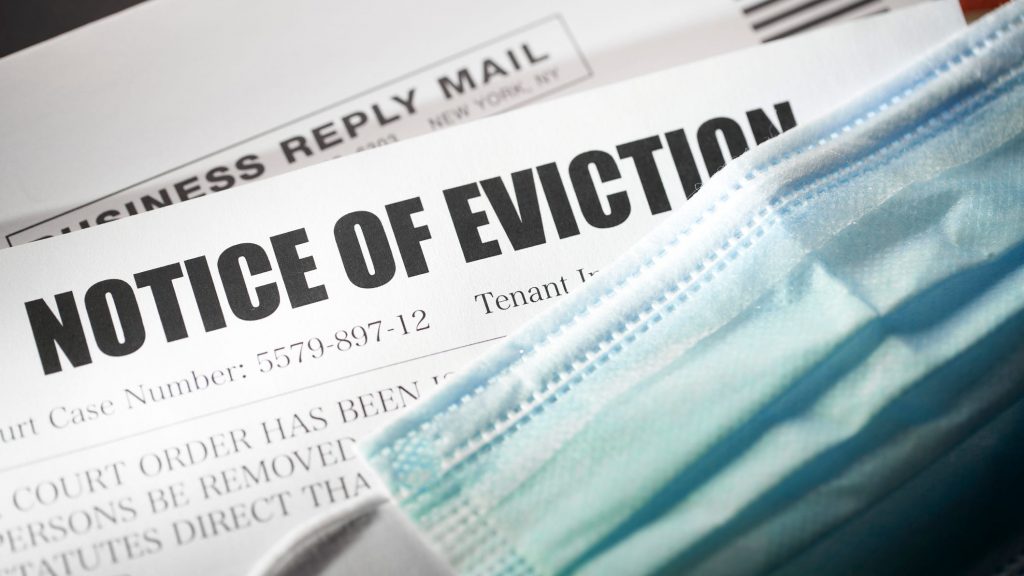On Tuesday night, August 3, after facing mounting pressure, the Centers for Disease Control (CDC) put forward a partial and temporary eviction moratorium after the previous moratorium expired on Saturday. The new order expires on October 3 and covers only counties with “substantial” or “high” levels of Covid-19 transmission. While the exact threshold for this high transmission designation is unclear, the press is reporting that it includes 80 percent of U.S. counties.
On June 30, the Supreme Court ruled, with Brett Kavanaugh as the decisive vote, that congressional action would be needed to extend the moratorium past the July 31 expiration date. The House of Representatives was adjourned by Nancy Pelosi on Friday, July 30, leaving the eviction moratorium to expire. The public outcry was immediate; many argued that as coronavirus cases rise, evicting thousands of people would be inhumane and a massive public health concern. The eviction moratorium was expiring just as states were moving to reinstitute mask mandates and announcing vaccine requirements for government employees as Covid-19 cases rise and concern is mounting regarding the Delta variant. The night before the lapse, Democratic Representatives Cori Bush, Alexandria Ocasio-Cortez, Jamal Bowman, and dozens of activists camped out in front of the Capitol demanding an extension of the eviction moratorium.
The Biden administration wrung its hands and claimed there was nothing the president could do to extend the eviction moratorium — which turns out wasn’t true. On Monday, the eviction moratorium was extended due to the Delta variant outbreak.
CDC Director Rochelle Walensky explained that “the emergence of the Delta variant has led to a rapid acceleration of community transmission in the United States, putting more Americans at increased risk, especially if they are unvaccinated. This moratorium is the right thing to do to keep people in their homes and out of congregate settings where Covid-19 spreads.”
However, a moratorium is not enough. Not even close.
For one, what about the 20 percent of counties not covered by the current eviction moratorium? Those evictions will begin now, away from the cameras and without coordinated eviction defense actions — all while the moratorium is being touted as a success.
But a temporary eviction moratorium is also insufficient. All evictions should be banned and all rent payments during the pandemic should be forgiven. Any other course of action is a half measure that will only lead to mass evictions later on. Fighting for this should be part of a broader movement to fight for free public housing. Housing is a right; homelessness is a health crisis, regardless of whether there is a pandemic..
The Pandemic Housing Crisis
The impending evictions after a year and a half of pandemic are disgraceful and dire. Though precarity for renters had been growing long before Covid-19, the pandemic has exacerbated this predicament in disproportionate and devastating ways. According to an analysis by the Consumer Financial Protection Bureau of Census Household Pulse Survey data, around 18.6 million Americans reported experiencing housing distress (defined as falling behind on mortgage or rent payments), and about 16 percent of U.S. renters are at risk for eviction.
There are more than 11 million tenants in the United States who are behind on rent. In New York City alone, 500,000 tenants owe back rent, and more than 65,000 eviction filings already on the books.
Throughout this last year and a half, people have accumulated massive debts to their landlords. For example, NPR highlighted the story of Meyran Massedaud, a former Uber driver and single dad of a 10 year-old daughter. With his daughter at home, he stopped driving during the worst months of the pandemic. As a result, he owes more than $15,000 dollars in back rent, and his landlord filed an eviction case against him.
While the American Rescue Plan passed in March allocated more than $46 billion for rental assistance, only a small fraction of that amount has been delivered to those who need it. The legislation created an endless bureaucracy, with each state and county making their own confusing regulations and failing to convey those rules to tenants. In New York, fewer than 70 households have received rent relief out of more than 160,000 applicants in the state. Massedaud’s county caps relief at $5,000 — only a third of the $15,000 he owes. Landlords, many of whom are themselves receiving assistance, are moving to evict even those tenants with checks on the way.
This stopgap solution isn’t working. It places the burden on the working class to spend hours navigating an endless bureaucracy that may or may not provide them some paltry relief.
Despite the eviction moratorium, landlords haven’t stopped filing eviction proceedings. This means that for countless people, their record will be forever stained with an eviction notice, making it more difficult to get housing in the future. In fact, many landlords have taken advantage of the brief lapse in the moratorium. Rent relief is sometimes not enough to stop landlords from evicting tenants, as was the case for Shea Mills in Biloxi, Mississippi.
A Racist Housing Crisis
The pandemic has had a disproportionately high impact on communities of color, especially Black and Latinx communities. This is especially true in the realm of housing. Across the country, Black renters are nearly four times as likely to be behind on their rent as white renters. Black women are the most likely to be evicted because of a greater likelihood of precarious employment and the wage gap. The U.S. Census Bureau Household Pulse Survey noted that 29 percent of Black tenants and 20 percent of Hispanic respondents said they had deferred or not paid their rent, while among white tenants, the figure was only 11 percent. These inequitable conditions existed long before the pandemic, but were exacerbated as Covid-19 spread across the United States. This is why tenants’ rights and BLM activists raised canceling rent as a central demand throughout the mobilizations of the past year, and why we must take this demand up again.
Racism is apparent in who is being targeted with evictions. In Philadelphia, for example, landlords are more than twice as likely to file for evictions against Black renters than white renters. Another study found that Pretium Partners, a corporate landlord, filed four times as many evictions in predominantly Black counties in Georgia than it did in white counties in Florida. These patterns are not isolated; they exist all over the country.
Housing discrimination throughout U.S. history has ensured that Black people in particular have significantly decreased access to home ownership. In 2019, the U.S. homeownership rate was 64.6 percent. Among Black Americans, it was just 42.1 percent. This is the result of redlining, racial covenants, the racist G.I. Bill that followed World War II, and decades of discrimination.
Undocumented immigrants are very unlikely to apply for any housing help, meaning they are disproportionately likely to have current eviction proceedings and to be evicted when the eviction moratorium is lifted. Documented’s Amir Khafagy highlights the story of 49-year-old Maria Fernandez, a domestic worker who was laid off during the pandemic. Her debt to her landlord grew to $28,220 during the pandemic. When New York State’s $2.7 billion federally-funded rental assistance program (ERAP) opened for applications in June, she tried to apply. Khafagyhighlighted that the website was full of technical glitches that made applying very time consuming. Since Fernandez was not able to contact her landlord to get a letter expressing the need for rental assistance, she was unable to apply.
Fernandez said, “It begs the question, why are they doing this to us? Is this a form of discrimination against us? I really don’t know why this is happening to me.”
This sentiment is echoed by people across the country.
Capitalism Is to Blame
The truth is that there is not a housing crisis in the United States; there is a crisis of capitalist hoarding of empty homes. There are more than enough houses to accommodate the country’s population. In fact, the United States has 59 empty homes for each unhoused person. One in 10 Manhattan rental apartments is entirely vacant.
This is because under capitalism, housing is a commodity rather than a right — a condition that has existed long before the pandemic. In 1872, Engels published a pamphlet titled “The Housing Question in which he outlined a dire crisis plaguing the German working class after a rapid process of industrialization and migration to urban centers. Unlike several of his contemporaries, he understood that the housing crisis could not be solved by capitalists. He recognized that for the bourgeoisie, the accumulation of capital is a cyclical one that requires destruction and “regeneration” (a euphemism for displacing the working class with wealthier renters) to further their profits. Far from solving the housing question, it merely reproduces it somewhere else.
You may be interested in: How Would Lenin Solve the Housing Crisis?
In the wake of the 2008 financial crisis, housing trends in the United States began to shift from ownership to renting. In 2011, at the height of the foreclosure nightmare, the giant investment bank Morgan Stanley published a report titled “A Rentership Society”, advising institutional investors to buy up “distressed” single-family homes and turn them into long-term rental units. At the same time, the Federal Housing Finance Agency (FHFA) initiated a huge pilot program for private investors to buy up government-owned foreclosed properties. Rental real estate became increasingly consolidated in the hands of huge corporate landlords. For tenants, this new landscape has beencharacterized by hiked rates, exorbitant and needless administrative fees, and ignored maintenance requests.
Housing is a safe investment for capitalists: the value of housing tends to grow, allowing landlords to rake in ever more profit from tenants. Over the last decade, the median home value has grown nearly 70 percent, while median income has grown only 30 percent. In 2020, New Yorkers spent 32.5 percent of income on rental housing alone. Often (though not always), tenants are workers who lack the means to own homes themselves. Others find home ownership burdensome due to the unpredictable and transient nature of work and volatile appreciation rates. For the working class, home ownership is precarious and unattainable.
Forgive All Rent, Fight for Free Public Housing
A partial extension of the eviction moratorium is not enough. It just kicks the problem down the road, evicting people later when the pandemic has subsided a little bit. What we need is to forgive all rent owed, now.
Further, we need a movement to provide housing for all by seizing the millions of apartments and houses that are sitting empty from profit-seeking landlords. We need free, public housing, acquired by expropriating the large landlords with more than enough property and distributing it to people in need of housing. After all, there is more than enough housing to accommodate the entire unhoused population in the United States.
For that, we will need a mass movement in the streets, in our neighborhoods, and in our workplaces. We will need to mobilize all the folks who are struggling to pay rent all over the country, and everyone who chanted Black Lives Matter last summer. The struggle for Black liberation is inseparably tied to the fight for fair housing. We need to demand that unions organize and mobilize members to protect friends, family, and neighbors. And it’s key to realize that we cannot entrust this struggle to the Democrats.
The Democratic Party, like the Republicans, is supported by large landlords. Real estate lobbyists flood Democratic super PACs with donations, and they received almost $90,000,000 in 2020 alone (almost double the previous year’s amount). In fact, only a week before the eviction moratorium ended, real estate tycoon George Marcus donated $1 million to the House Majority PAC. Rashida Tlaib is now calling on Democrats to give that money back. But this isn’t about one donation; it’s about the entire system. With all the money of all the billionaires who don’t pay taxes, luxury public housing could be built. Instead of the $753.5 billion spent on the defense budget, every single unhoused person could be housed multiple times over. Instead of the billions spent on racist police, there could easily be free public housing. Predictably, folks from the progressive wing of the Democratic Party have voted for these defense and police budgets. It’s not a question of lack of funds, or even about one big donation from real estate moguls. The entire system is organized to prevent wealth redistribution that would allow us to build what we really need.
The struggle to forgive all rent can only be won by a movement that doesn’t put any trust in the Democratic Party. Even the progressive wing of the Democratic Party has made clear that it’s willing to throw the movement under the bus, for example with Ilhan Omar recently voting funds for Israel, or Bernie Sanders giving up the fight for Medicare for All. These figureheads won’t build the movement we need.
A Fighting Movement
The working class must organize to overcome the artificial divides between the housed and the unhoused. The reinstatement of the eviction moratorium is a temporary measure to lull people back to sleep so landlords can continue to force out the most vulnerable from their homes. We cannot close our eyes to a single eviction.
In the 1930s, the radical labor movement and communist movement organized the kind of eviction defense and fighting movement for housing we need today. Howard Zinn highlights it in A People’s History of the United States. He writes, “All over the country, people organized spontaneously to stop evictions. In New York, in Chicago, in other cities — when word spread that someone was being evicted, a crowd would gather; the police would remove the furniture from the house, put it out in the street, and the crowd would bring the furniture back. The Communist party was active in organizing Workers Alliance groups in the cities.”
Workers would refuse to unplug electricity, or come in to reconnect the gas, highlighting the import role of the working class. Of course, the Stalinist Communist Party would later back FDR and backtrack from these radical actions, seeking capitalist peace during World War II. But these examples are still important and valuable to highlight that we have a tradition of radical eviction defense in the United States.
This tradition must be rebuilt, and socialists have a key role to play, independent from the Democrats who will only quash the movement. The struggle for the right to housing is not over. Against capitalist irrationality, we must fight to end all rent debt immediately, organize to protect people from eviction, and demand free public housing for all.












